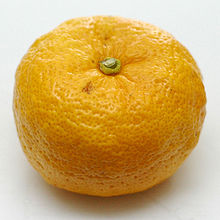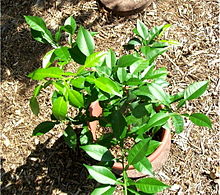- Yuzu
-
This article is about the fruit. For other uses, see Yuzu (disambiguation).
Yuzu 
Yuzu branch with ripe fruit Scientific classification Kingdom: Plantae (unranked): Angiosperms (unranked): Eudicots (unranked): Rosids Order: Sapindales Family: Rutaceae Genus: Citrus Species: C. ichangensis ×
C. reticulata var. austeraBinomial name Citrus ichangensis ×
Citrus reticulata var. austeraThe yuzu (Citrus ichangensis × C. reticulata, formerly C. junos Siebold ex. Tanaka; Japanese ユズ, 柚, 柚子 (yuzu); 유자 (yuja) in Korean; from Chinese 柚子, yòuzi) is a citrus fruit and plant originating in East Asia. It is believed to be a hybrid of sour mandarin and Ichang papeda. The fruit looks a bit like a very small grapefruit with an uneven skin, and can be either yellow or green depending on the degree of ripeness. Yuzu fruits, which are very aromatic, typically range between 5.5 and 7.5 cm in diameter, but can be as large as a grapefruit (up to 10 cm or larger).
Contents
Description
Yuzu forms an upright shrub or small tree, which commonly contains numerous large thorns. Leaves are notable for a large petiole, resembling those of the related kaffir lime and ichang papeda, and are heavily scented. Yuzu closely resemble sudachi in many regards; they share a similar mandarin-ichang papeda ancestry, though sudachi will eventually ripen to an orange color, and there are subtle differences in the flavor of the fruit.
The Yuzu originated in China, and also grows wild in central China and Tibet. It was introduced to Japan and Korea during the Tang Dynasty and it is in these nations that it is cultivated most widely.[1] Confusingly, in modern Chinese, the name 柚子 (yòuzi) refers to the pomelo, while the yuzu is known as 香橙 (xiāngchéng).
It is unusual among citrus plants in being relatively frost-hardy, due to its cold-hardy C. ichangensis ancestry, and can be grown in regions with winters at least as low as -9°C (15°F) where more sensitive citrus would not thrive. In Japan, an ornamental version of yuzu called hana yuzu (花ゆず, 花柚子) "flower yuzu" is also grown for its flowers rather than its fruit. A sweet variety of yuzu known as the yuku became severely endangered during the 1970s and 1980s; a strong attempt has been made at reviving this varietal in southern Japan.[2]
Another variety of yuzu with knobby skin is called shishi yuzu (獅子柚子, literally "lion yuzu").photo
Use in Japanese cuisine
The yuzu's flavor is tart, closely resembling that of the grapefruit, with overtones of Mandarin orange. It is rarely eaten as a fruit, though in the Japanese cuisine its aromatic zest (outer rind) is used to garnish some dishes, and its juice is commonly used as a seasoning, somewhat like the way the lemon is used in other cuisines. It is an integral ingredient (along with sudachi, daidai, and other similar fruits) in the citrus-based sauce ponzu, and yuzu vinegar is also produced. Yuzu is often combined with honey to make yuzu hachimitsu (柚子蜂蜜) - a kind of syrup that is used to make yuzu tea (柚子茶) or as an ingredient in alcoholic drinks such as the yuzu sour (柚子サワー).[3] It is also used to make liquor (such as yuzukomachi, 柚子小町) and wine.[4][5] Yuzu can also be used to make various sweets including marmalade and cake. Yuzu kosho (also yuzukosho, literally "yuzu and pepper"), is a spicy Japanese sauce made from green or yellow yuzu zest, green or red chili peppers, and salt. Slivered yuzu rind is also used to garnish a savory, salty egg-pudding dish called chawanmushi, as well as miso soup.[6]
It is often used alongside with sudachi and kabosu.
Use in Korean cuisine
In Korean cuisine, yuzu (called yuja in Korean) is used, thinly sliced and combined with sugar and honey, to make a thick, marmalade-like syrup containing pieces of the chopped rind and fruit. A tablespoon of this syrup (which can either be made at home or purchased in glass jars) stirred into a cup of hot water makes a beverage called yujacha(유자차0), lit. "yuzu tea", which is used as a herbal remedy for the common cold and similar winter illnesses.
It is also used to make yuja hwachae, a variety of traditional fruit punch.
Use in Western cuisines
Beginning in the early 21st century, yuzu has been increasingly used by chefs in the United States and other Western nations, achieving notice in a 2003 article in The New York Times.[7] The Finnish soft drink manufacturer Hartwall has a limited edition soda which contains yuzu. Yuzu has also been used in beer, in the Dutch beer called iKi[8] and in Finnish cider called Golden Cap Black,[9] brewed in Finland. BridgePort Brewing also used the fruit in its new summer beer, Summer Squeeze.[10]
Other uses
Yuzu is also known for its characteristically strong aroma, and the oil from its skin is marketed as a fragrance. In Japan, bathing with yuzu on Toji (the winter solstice) is a popular custom. The whole fruits are floated in the hot water of the bath (sometimes enclosed in a cloth bag), releasing their aroma. The fruit may also be cut in half, allowing the citrus juice to mingle with the bathwater. The 'yuzuyu,' or yuzu bath, is said to guard against colds, warm the body, and relax the mind.
The body of the taepyeongso, a Korean traditional oboe, is often made from yuzu wood.
See also
- Papeda[disambiguation needed
 ]
]
References
- Karp, David. "Secrets Behind Many Chefs' Not-So-Secret Ingredient." The New York Times, December 3, 2003, Dining In, Dining Out/Style Desk, Section F, p. 12.
- Kurokawa, Yoko. "http://www.tokyofoundation.org/en/series/japanese-traditional-foods/vol.-11-the-yuko-a-native-japanese-citrus"
- ^ http://www.citrusvariety.ucr.edu/citrus/yuzu1.html
- ^ http://www.tokyofoundation.org/en/series/japanese-traditional-foods/vol.-11-the-yuko-a-native-japanese-citrus
- ^ http://www.kikkoman.co.jp/homecook/search/recipe.php?numb=00003764
- ^ http://www.bunitedint.com/portfolios/producers/kiuchi/yuzu_wine/overview.php
- ^ http://www7.airnet.ne.jp/yamadaya/yuzu.JPG
- ^ http://www.sfgate.com/cgi-bin/article.cgi?f=/c/a/2006/05/31/FDGAPJ27A31.DTL&hw=yuzu&sn=001&sc=1000
- ^ http://www.nytimes.com/2003/12/03/dining/03YUZU.html?ex=1385787600&en=503d5cd5111f4124&ei=5007&partner=USERLAND
- ^ http://www.ikibeer.com/
- ^ http://www.sinebrychoff.fi/page.php?page_id=189&id=380
- ^ http://beernews.org/2011/05/bridgeport-summer-squeeze-debuts-may-16th/
External links
- "Yuzu Wisely - Japan's power citrus is a welcome cocktail alternative", by The Tasting Table, August 29, 2009
- Article about yuzu
- Article from The New York Times
- "Yuzu & Huckleberry: Flavors of the Moment", by Janet Fletcher, from San Francisco Chronicle, Wednesday, May 31, 2006
- Yuzu articles
- Photo of a bottle of yuzu juice
- "Food Marketers Put Taro, Yuzu In Recipe For Growth", by Sonia Reyes, from Brandweek, June 26, 2006
Listening
- "Cooks Look for Answers to Citrus Freeze", from National Public Radio Weekend Edition Sunday, January 28, 2007
Categories:- Citrus
- Fruits originating in Asia
- Japanese fruit
- Japanese cuisine terms
- Korean ingredients
- Hybrid Citrus
- Papeda[disambiguation needed
Wikimedia Foundation. 2010.




